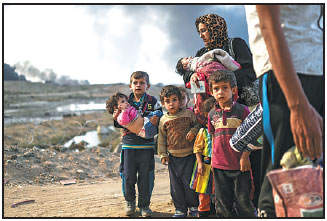 |
|
Iraqi families displaced by the ongoing operation by Iraqi forces against the Islamic State group to retake the city of Mosul, are seen near Qayyarah on Saturday.Bulent Kilic / AFP |
Four months after the Iraqi government retook control of Fallujah, the Iraqi military and Kurdish militias, backed by international coalition airstrikes, launched a large-scale military offense on Oct 17 with the aim of restoring government control over Mosul, once Iraq's second largest city, now de-facto capital of the Islamic State militants in Iraq.
"The hour has come and the moment of great victory is near," Iraqi Prime Minister Haider al-Abadi said in a speech broadcast on state television, striking an optimistic note ahead of the operation to retake the last stronghold of the IS terrorists in Iraq.
He has grounds for optimism. Although it has held Mosul since they seized it in June 2014, the jihadi group has been struggling with short-ages of funds, combat personnel and equipment recently thanks to anti-terror efforts from the international community.
The IS has also lost large parts of the territory it held in Syria in recent months as the Syrian government, supported by Russian airstrikes, has intensified its efforts to counter both the terrorist group and rebels forces in Aleppo.
A report released by the European Parliament Subcommittee on Security and Defense earlier last month estimated the IS group had suffered between 12,000 to 15,000 casualties in Iraq and Syria.
All this seems to indicate the world's deadliest group of terrorists is facing defeat. However, it is still too early to claim victory.
The humanitarian crisis is obviously getting worse in Mosul.
Up to 1.5 million civilians remain in the city, according to the United Nations, which fears that as a last resort IS terrorists might use them as human shields. According to United Nations Office of the High Commissioner for Human Rights, IS operatives have forced thousands of families from four separate sub-districts of Mosul to move to its "strongholds".
The battle to recapture Mosul means further suffering for its residents, who have already suffered so much. Measures must be taken to address the humanitarian crisis in Mosul.
On the other hand, while much headway has been made in the fight against the IS group, speculation is rife over the future of Iraq in the post-IS era. Whether the fall of the IS terrorists in Iraq will bring peace to the country is a question whose answer remains to be seen.
Before the rise of the terrorist group, Iraq had been mired in factional squabbling. At present, the major factions in Iraq have temporarily put aside the grudges and feuds they hold with one another in order to deal with their common enemy, the IS terrorists.
After the fall of the group in Iraq, if a national reconciliation process cannot be started in time there is no guarantee that the Middle East country will not slip into further chaos and internal fighting.
How has Iraq ended up like this? In the final analysis, the United States bears the responsibility. After it toppled the Saddam Hussein regime in 2003, the divide between the Shiites and the Sunnis in the country deepened, and the US failed to address it. Iraq's factional rift is a major reason behind the rise of IS terrorists in the country.
Now that the war against the world's deadliest terrorist group has come to a critical moment, the different forces in Iraq should concentrate on their anti-terror efforts while at the same time thinking about the future of their country.
The author is deputy editor-in-chief of China Daily Asia Pacific. jasmine@chinadailyhk.com